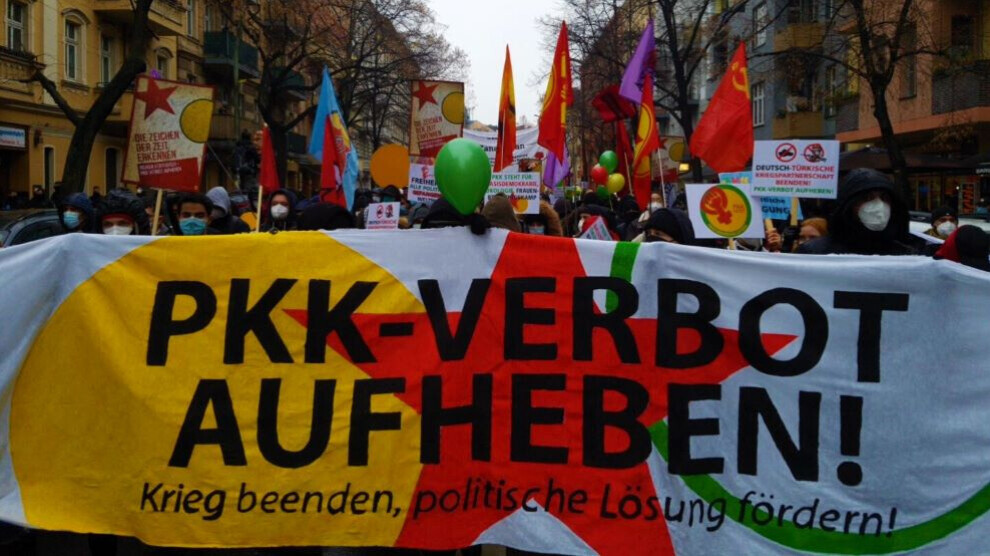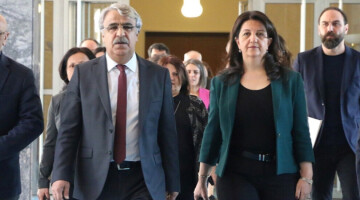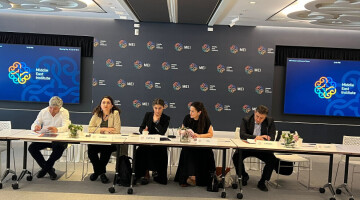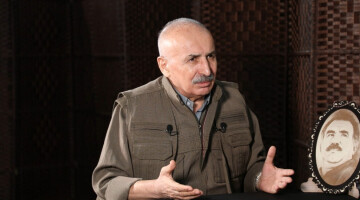In a statement on Germany's new administration, the Foreign Relations Committee of the Kurdistan Workers' Party (PKK) highlighted the necessity for a new and distinct Kurdish policy.
The statement remarked that the justifications offered for the PKK ban in Germany were not appropriate and that these reasons had also disappeared, and there was a call for Germany to contribute to the resolution of the Kurdish question. While the PKK desired a new chapter to be opened, particularly with reference to the Kurds, it stated that they were ready for dialogue at all levels.
APPEAL TO THE GERMAN STATE ON THE OCCASION OF NEWROZ
The statement of the PKK (Kurdistan Workers’ Party) Foreign Relations Committee is as follows:
“The Social Democratic Party (SPD), the Greens, and the Free Democratic Party (FDP) have formed a new administration in Germany at the end of Angela Merkel's 16-year administration. The new government stated that it would base its foreign policy on "values", including democracy, the rule of law, and respect for human rights. Germany's past governments harmed our people and movement significantly through their foreign policy, backing Turkey's anti-democratic practices. This policy not only retarded the resolution of the Kurdish question but also affected social harmony in Germany, the country where the vast majority of diaspora Kurds reside. We believe that a new approach is now required. We would like to deliver this message to the public in honour of the upcoming Newroz holiday.
OUR FIGHT IS AGAINST INEQUALITY, OPPRESSION AND, INJUSTICE
As a movement, we place a high value on international solidarity. Since its foundation, the PKK has been a movement that promotes human solidarity and coexistence. Our movement has never equated any people or group, particularly the Turkish people, with the sovereign state, and while fighting in self-defence against state aggression and denial, it has been founded on growing closer to and collaborating with the peoples. On March 21, 2013, in front of the international media and millions of Kurds, our President, Mr Abdullah Öcalan, stated, "Our fight has not been, and cannot be, against any race, religion, sect, or group. Our struggle has been against tyranny, ignorance, unfairness, backwardness, and all forms of oppression." In his defence writings, with his notion of a "democratic nation," which he describes as one of the most important results of our history of struggle, he provides a theoretical structure to peace and common existence of peoples and places it at the centre of our new paradigm
A NEW UNDERSTANDING OF NATION
This theory has led to a novelty in Turkey and the Middle East, where political conditions are characterized by ethnic and religious polarization and hate speech. In Kurdistan, this novelty finds expression, on the one hand, in the establishment of democratic platforms or alliances, under whose umbrella the entire pluralism of society comes together and works for a democratic life. On the other hand, it finds expression in the revolution of Rojava, where different ethnic and religious groups have created the example of how they can live together in their diversity without fighting each other. These examples have only become possible through a new understanding of nation. The democratic nation, in contrast to the understanding of the nation-state, does not place a language or ethnicity at its center. It is based on a collective society that has created free individuals and communities at their own will. In this way, the theory of the democratic nation overcomes the political philosophy based on identities and the nation-state, and allows all peoples, communities and oppressed people to form a common nation. The fact that a genocidal force like ISIS could be defeated through the resistance of peoples who came together under the umbrella of a democratic nation cannot be explained by military factors alone. Behind this is also the unconditional belief in an alternative life.
At the center of this new way of life are common life, pluralism of faith communities, and women's freedom. The struggle for women's liberation occupies a central place in our resistance and in our social relations. We understand women's freedom as the first step towards all other freedoms. The impact of women's revolution is evident not only in the Kurdish society but in the whole Middle East. The woman is not only a pioneer in the struggle against any regression and a defender of social life, she is also a significant force in the political and civil society work through the system of gender parity, dual leadership and equal representation.
WE ARE A SECULAR MOVEMENT
We are a secular movement. We approach all faiths equally, but at the same time, we work to protect those ethnic and religious communities that are under threat. For this reason, we fought a great battle in 2014 to protect the Yazidi Kurds from genocide in Shengal. The fight that the PKK waged in Shengal against ISIS was also an issue in the German Bundestag. Although these discussions did not last long, the irrelevance of the PKK ban was publicly discussed in 2014, albeit briefly. Even German arms deliveries to the PKK were an issue at the time. Various deputies, including from the governing parties, expressed their gratitude to the PKK and advocated direct talks with our party. Subsequently, the attack on Kobanê took place. Here, the fight of the YPG and YPJ, but also the support of guerrilla fighters of the PKK, who had moved to defend the city, together with the help of the International Coalition, led to the inhuman organization of ISIS suffering a significant defeat.
OUR STRUGGLE IS AGAINST THOSE WHO INVADE OUR COUNTRY
We are the freedom movement of the peoples who are at home in the geographical area of Kurdistan. Our problem is with the regressive, fascist nation-states and their local collaborators who reject the existence of the Kurds, their identity and their equal life. Therefore, our struggle is limited to the struggle with those actors who have occupied our homeland. We have no interest or intention in taking our struggle to other countries, let alone the countries of Europe. Many independent observers have confirmed that where our struggle has had its effect, nationalist, racist, discriminatory or patriarchal discourses have been eliminated, while a rhetoric of equality, which is also willing to confront its own history, has gained prominence.
While we are in a struggle against the colonialist forces, we are also striving to initiate democratic change together with the progressive actors of the respective countries. Instead of the goal of changing the existing borders of the region, we are pursuing the intention of democratizing the ruling countries and building democratic autonomy for our society. The struggle for freedom of our society is developing, connected and in step with the struggle for democracy in the respective countries. Thus, our struggle has developed until today through cooperation with the democratic actors in Turkey, Iraq, Syria and Iran.
THE ARMED STRUGGLE AROSE FROM A NECESSITY
The armed character of our struggle has not come out of free choice, but out of a necessity. Both our struggle and the reality of life have shown that the atmosphere in which even a Kurdish name was banned, in which the fascism of the military coup of September 12, 1980 bulldozed any progressive movement, in which inhuman torture methods were practiced on prisoners in the dungeon of Amed (Diyarbakir), could only be overcome through armed resistance. At the same time, when the conditions were right, we responded positively countless times to the calls of civilian organizations as well as democratic countries and declared ceasefires to pave the way for a peaceful solution. However, each of these ceasefires failed due to the attacks of the Turkish state. From 2013 to 2015, we even withdrew our armed forces from the territory of Turkey, created a peaceful atmosphere and put the political struggle at the center. During this period, the HDP was also founded and received great popular support. However, Turkish President Erdoğan "froze" the resolution process in his words and in 2015 he initiated a phase in which he razed entire Kurdish towns to the ground, destroyed historical sites, and burned alive injured and elderly people who sought shelter in the basements of their homes. The February 2017 report of the UN High Commissioner for Human Rights described the conditions in Kurdish cities as a result of this war as "apocalyptic." Despite these atrocities committed by the Turkish government, we have not abandoned our principles of democratic struggle, either in the Kurdish areas or in Europe.
AGAINST VIOLENT OR ILLEGAL FORMS OF ACTION
Most Kurds living in Europe are people who experienced suffering in Kurdistan and had to flee from the oppressive policies of the Turkish state. In order to direct the eyes of the world public to the oppression and suffering in Kurdistan, they organize various actions. Our central aim is that the meetings, conferences and protest actions that take place in this context are carried out in the spirit of the cause in a democratic framework. Our goal is that all forms of action remain within the legitimate democratic framework. Neither do we want nor do we accept that anyone resorts to violent or illegal forms of action. As a movement, we are bound by the statements that our organizational leadership has made in the past on this issue. We would like to emphasize that again at this point.
PROHIBITION POLICY INTENSIFIED
Parallel to this, Germany continues to pursue a policy of repression and prohibition against our movement. Since the enactment of the so-called PKK ban on November 26, 1993, this policy has been intensified. This ban has been extended so much that, today flags, colors, slogans and even names are affected. The prohibition practice goes so far that media institutions and cultural associations are searched and banned, or that archives that are culturally important for Kurdish society are confiscated by security forces. This practice of banning has had an impact on Kurdish society, and thousands of people have been harmed by it in various ways. While the German state is implementing this prohibition practice, it is not only extending its own law almost beyond recognition, but is also trampling on the rights of its citizens as enshrined in the Basic Law. When it comes to the Kurds, the claim of a democratic state quickly gives way to a state that places the police and the protection of the constitution at its center.
THE PARADIGM SHIFT OF THE PKK IS NOT TAKEN INTO ACCOUNT
The face of Germany that the Kurds see is that of the policy of prohibition. This face has no relation to the practice of our movement nor to the reality of our society. The justifications with which the ban is to be legitimized not only lack legitimacy, they have also become completely groundless in the course of the past. Especially against the background of the paradigmatic change that our movement has undergone in its more than 30-year history, Germany should overcome its approach based on the practice of banning. This would help Germany to build a proper relationship with the Kurdish society and at the same time open up in the Middle East.
NO GERMAN-TURKISH RELATIONS AT THE EXPENSE OF THE FUNDAMENTAL RIGHTS OF KURDS
Historically, Germany bears no responsibility for the division of the Kurdish settlement areas into four parts. However, it has never questioned the British-French policy in the Middle East, which is based on the denial of Kurdish existence, or developed its own alternative approach. As a movement, we have no intention of harming or calling for the end of German-Turkish relations, which have a long history. That is not in line with our political course. However, we demand that these relations not be conducted at the expense of the fundamental rights of Kurdish society. Instead, relations should be maintained by Germany in a way that is in the interest of both the Kurdish and the Turkish people, and thus take on a productive and solution-oriented character. We expect that these relations will contribute to an end of the war, the achievement of a political solution and the democratization of Turkey. In our view, such a character in German-Turkish relations would also be more in Germany's interests. The existing PKK ban, on the other hand, serves a discourse that leads to a continuation of the clashes, to the justification of any violence against Kurdish society and to the persistence of Turkey in an anti-democratic state.
NO END TO THE POLICY OF BLACKMAIL WITHOUT TURKEY’S DEMOCRATIZATION
The Turkish approach to the Kurdish question is based on annihilation and ethnic cleansing. This approach is not only applied within Turkish state borders, but also in Syria and Iraq. Turkey is largely responsible for the fact that the crisis in Syria has intensified so much within a very short period of time and has led to the mass exodus of the Syrian population. It is well known that the Turkish government has subsequently used the refugees as a means of threat and blackmail against Germany and the entire EU. Without a peaceful political solution and a democratization of Turkey, there is no doubt that this blackmail policy will not come to an end either. But today, besides Germany's ban policy, the leadership of our movement on the EU terror list is one of the biggest obstacles to a political solution.
TAKE THE PATH OF A NEW AND INDEPENDENT KURDISH POLICY
If the German government is able to move beyond its banning practices and play a constructive role in resolving the Kurdish question, it will strengthen Germany's influence as a democratic country. If not, the German government will continue to provide the justification basis for the anti-democratic, totalitarian and fascist practices of the Turkish state. The new federal government in Germany is trying to re-situate its place and role in world politics. We hope that in this context the practice of banning the Kurdish population will be urgently overcome and in its place the path of a new and independent Kurdish policy will be taken.
PUT THE CLAIM “DARE MORE PROGRESS” INTO PRACTICE
The new coalition government has presented its partnership agreement to the public under the title "Dare more progress". For this reason, it is also expected to bring about real change with bold steps. We believe that a new page should also be opened in this framework with regard to Kurdish society. The lifting of the ban, which harms the Kurds and Germany alike, would be an important starting point. Related to this, Germany could also take on a constructive mission in solving the Kurdish question, which would not only bring it closer to the Kurdish and Turkish population, but also contribute to peace and stability in the Middle East. Steps in this direction would also have an important meaning for democracy and stability in Europe. Our movement is ready for dialogue at all levels on these issues."














